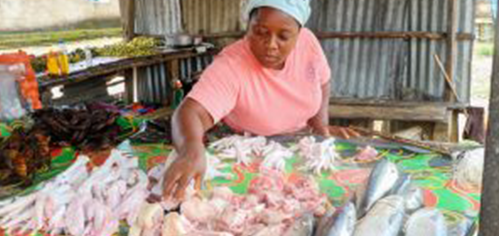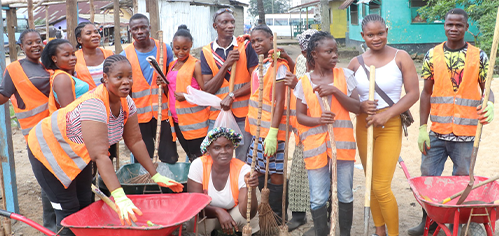
Home / Components

This component will provide support to poor and vulnerable households in Montserrado and Margibi Counties, operating Non-Farm Household Enterprises (small businesses) in urban areas that have been impacted by the spread of COVID-19 in
Liberia and the current global food and fuel crises on their livelihoods. Specifically, the component will protect livelihoods by providing support to small businesses that would likely have survived had COVID-19 not struck, and that could be expected to continue to provide livelihoods once the pandemic has passed.
For each household selected to receive the grant, a household representative will be selected to represent the household in terms of participating in the business
management training, getting registered for mobile money, and receiving the cash grant on behalf of the household. This representative must be female for at least 50
percent of the households selected for the grant support.
Grant Support to Vulnerable Households to Revive or Start Small Businesses (SSB) This component has reached 3,055 of the targeted 4,450 beneficiaries. During round one implementation, 1,280 beneficiaries from the existing business category were enrolled and received US$900 each totaling US$1,152,000. The said amount was used by beneficiaries to revive small businesses in Montserrado County. The second phase of
implementation is ongoing with 1,775 (400 new business and 1,375 existing business) beneficiaries in both counties. Out of the 1,775 beneficiaries, 1,550 of them have received US$450 of US$900. Meanwhile, 225 beneficiaries who were just recruited are expected to receive the first tranche business grant of $450.

Component of the REALISE Project is intended to provide short-term jobs for 17,000 vulnerable workers in the informal sector, as well as employability development training to enable them to make informed decisions that would better their lives, and re-enter into productive engagements. It also seeks to improve the general living conditions of poor and vulnerable communities. Accordingly, implementation will be in rounds. Each implementation round will last for six (6) months.
Vulnerable workers in the informal sector will be provided short-term jobs in one of the following areas: supplementary health care services, beautification (painting of crosses and sidewalks, public buildings, planting of trees, recreation centers, street naming, coding of homes) and waste & sanitation/cleaning of community alley.
Each beneficiary is guaranteed 60 days of paid labor under the LIPW. Labor subsidy allowance is calculated at a daily rate of US$4 and US$7 per day. Throughout the engagement, beneficiary workers are therefore expected to access US$240 and Supervisors US$420 as labor subsidies for their participation in subproject activities
Component resources support the provision of grants for procurement of simple tools and materials to implement subproject activities, labor subsidies to assist beneficiaries with some of their needs while executing subproject activities, and delivery of life skills and employability development training to incorporate behavior modification around self-esteem.
Since the Component launch, on August 30, 2022, the TESEDVW Component has been providing
short-term jobs life skills, and employability development training to vulnerable
households in Montserrado and Margibi counties. The first round of implementation
benefited 2,500 individual households, while 3,300 beneficiaries are benefitting
under this current round of implementation. To date, Component activities have
reached a total of 5,800 (3,114 females and 2,686 males) beneficiaries in 58 of 170
communities in these counties. These beneficiaries are significantly contributing to
improving the environmental conditions of their communities, as well as increasing
visibility.
Will finance capacity building and project implementation and coordination. This
component has three subcomponents: Sub-component 3a: Capacity Building and
Project Implementation and Coordination for MYS; Sub-component 3b: Capacity
Building and Project Implementation and Coordination for LACE; and
Sub-component 3c: Capacity Building and Project Implementation and Coordination
for MGCSP. This component will support capacity and systems building for key
stakeholders at all levels of the project. Specifically, it will need the following Technical Assistance (TA) to support the training of community structures involved
in project implementation. The training of community structures will focus on
community organization, project identification, beneficiary selection, and M&E.
Preparation of project operational procedures and guidelines;
Training for project staff, implementing agencies, and service providers;
M&E systems.
Provisional zero-value CERC to allow for rapid reallocation of loan proceeds from
other project components during an emergency. In the event of an eligible crisis or
emergency, the project will contribute to providing an immediate and effective
response to such crisis or emergency. This will allow for the rapid reallocation of
project funds in the event of a future natural or man-made disaster or crisis that has
caused or is likely to imminently cause a major adverse economic and/or social
impact during the life of the project. In the event of such an emergency, this
component would allow the Government to request the World Bank to re-categorize
and reallocate financing from other project components to cover emergency
response and recovery costs if approved by the World Bank.
The CLAS component aims to improve livelihood opportunities and climate resilience
for poor and vulnerable populations in rural areas of Liberia, directly responding to
the current food crisis. It targets 16,200 direct beneficiaries across 3 rounds of
implementation in 578 project communities and counties. It will support Beneficiary
Farming Groups (BFG) in developing subprojects, and receive US$1,800 farm start-up
grants to procure inputs.
Provide life Skills and business management training and promote climate-smart
agricultural practices. This component will offer cash transfers of US$350 to each
beneficiary as a labor subsidy to help smooth consumption during the lean season.
Provides Community Development Support (CDS) grants of up to US$1,800,
alongside technical assistance, to each participating community to help maintain or
improve small-scale common infrastructures,
Provide Technical Assistance (TA) and business grants of up to US$20,000 to
Cooperatives over three years to create market links support (MLS) for beneficial
groups and their communities.
Provide logistical assistance to MIA and MOA extension officers at the County and
district levels to support project beneficiaries.
The objective of this component is to support poor and food-insecure households in the selected counties through the provision of SCTs to targeted beneficiaries. Specially, it would provide income support to about 16,000 poor and food-insecure
households in River Gee, Grand Kru Grand Bassa, and Rivercess.
Strengthening of the National Social Protection System
The objective of this sub-component is to improve efficiency, enhance capacity
building, and strengthening the national social protection system through continued
development of the basic building blocks of a safety net delivery system.
The subcomponent will enhance the following: (a) consultant services to expand LHSR
data collection and functionalities of the MIS; (b) technical advisory services and
workshops to strengthen the LHSR visibility, utility, sustainability, and
interoperability; and (c) TA, assessments, and training to strengthen the GRM.
Currently, registration and enrollment of over seven thousand beneficiaries in Grand
Bassa County is taking place. Enrollment of 1,200 has also started in Grand Kru
County. The firm will also enumerate 15,000 households for the Social Registry in Grand Kru County.
